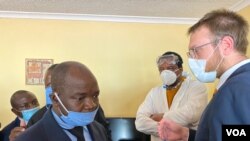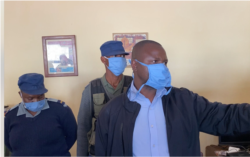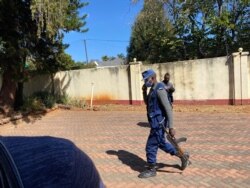Rights groups in Zimbabwe have condemned the arrests of a prominent investigative journalist and an opposition leader. Zimbabwean police say reporter Hopewell Chin'ono and the leader of the political group Transform Zimbabwe, Jacob Ngarivhume, were stoking violence ahead of a planned July 31 anti-government protest. Their supporters called the arrests a blatant attempt to silence voices against government corruption and abuse of power.
Detective Inspector Morgan Chafa, who arrested Chin’ono, asked journalists to leave the premises of Chin’ono’s home on Tuesday.
Police wanted to confiscate all his equipment, which they say he used to broadcast calls to “incite public violence” ahead of a planned nationwide protest on July 31.
But Doug Coltart and Beatrice Mtetwa of Zimbabwe Lawyers for Human Rights did not budge.
Coltart: “We would want to see the search warrant.”
Chafa: "It’s OK, we will show you."
Mtetwa: “But the warrant sir. We must see the warrant before you come in.”
A usually jovial Chin’ono, remained mum and subdued as his legal team argued with police. After some time, the police produced the warrant, but the lawyers said it only allowed them to confiscate “documents.” The police eventually left without taking the equipment.
But Chin’ono remains in police custody, one day after he was arrested at his home.
Police Monday also arrested Jacob Ngarivhume, of Transformation Zimbabwe, the political party that called for demonstrations on July 31.
Both men are now facing charges of inciting “public violence.”
Dewa Mavhinga, the Southern Africa director at Human Rights Watch, says the two were arrested on “spurious allegations.”
“The Zimbabwean authorities should not be arresting anti-corruption activists. Instead it should be taking sincere and genuine steps to end corruption. As a result we therefore call on the Zimbabwean authorities to release Hopewell Chin'ono and Jacob Ngarivhume immediately and drop these politically motivated charges and begin to show that, indeed, the country is serious about zero tolerance to corruption," he said.
Mavhinga says the arrests undermine confidence in Zimbabwe’s commitment to the rule of law and human rights.
“Calling for protests peaceful protests is not a crime. Journalism is not a crime. Section fifty-nine protects the right of everyone in Zimbabwe to peacefully protest. This must be respected," he said.
But Zimbabwean police appear not to be listening. The police say Chin’ono and Ngarivhume will be taken to court Wednesday.
Tafadzwa Mugwadi, the spokesman for the ruling ZANU-PF party, says human rights groups and Western embassies in Zimbabwe calling for the release of Chin'ono and Ngarivhume must be ignored.
“Honestly, on what basis does somebody call for insurrection, sedition and treasonous demonstrations on 31 July at a time the president has pronounced measures to fight COVID-19 and its spreading and then you say that person must be released? We don’t operate that way. Those who wish to be affected by the law must respect the law first. If you violate the law the consequences are clear,” he said.
President Emmerson Mnangagwa’s sympathizers have said on social media that the planned July 31 protests are meant to depose a legitimate government. The government has said it will deploy security forces — including the army — to quell any demonstrations.






